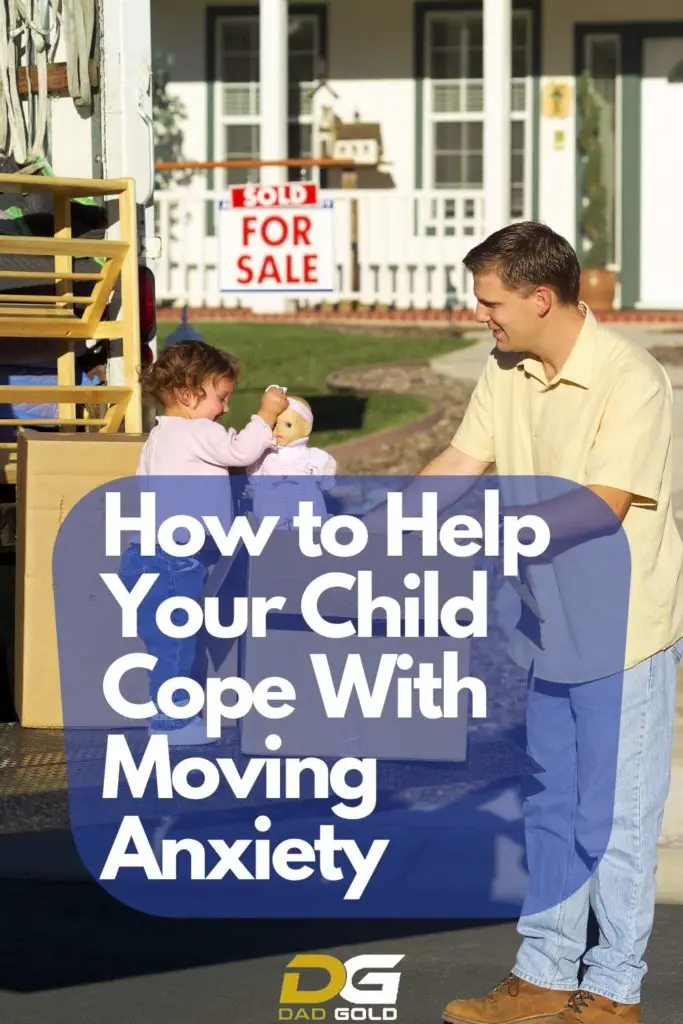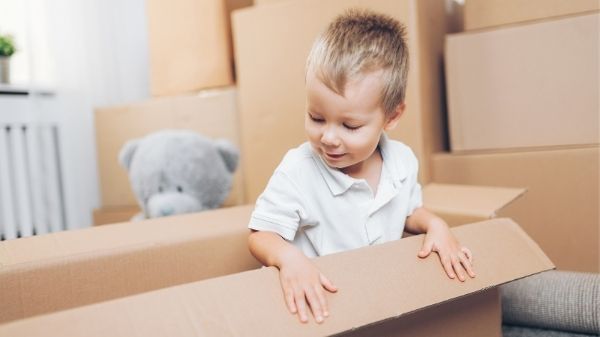You might need to move to a new home for various reasons. First, let it be starting a new job in another state, moving to a better school district, or simply upgrading to a bigger house; a move can be overwhelming for your kids on many levels.
But however hard, stressful, and uncertain it may be for the kids, sometimes moving is inevitable. This transition doesn’t necessarily mean it’ll be a life-altering negative experience.
With a bit of support from the parents, it may mean more growth and development opportunities.
First, we will examine why moving home and school may affect your child’s mental health and well-being. Then I’ll give you tips on how you can make the family relocation easier and help your child cope with moving anxiety.
Why would a child get anxious when moving home?
Children thrive on familiarity, routine, and predictability. When you announce a big move, the fear of change can cause stress in kids. They have to leave their beautiful room, say goodbye to their friends and teachers, adjust to a new school and community, and the list continues.
They don’t have a choice and gotta move with their parents even though they’re afraid of losing friends and finding their place in a new community. So they start acting out, young kids get more clingy, have some wet beds, and even experience physical pain.
According to a study published in the Journal of Personality and Social Psychology, kids who have moved frequently are more likely to experience anxiety, depression, and other mental health issues than their peers with more housing stability.
They also grow up as adults with fewer high-quality relationships, lower self-esteem, and poorer social-emotional well-being. While moving is a big deal for kids of any age, children under 5 years might be less affected by the move since they’re regarded as more malleable.
-

Bold Male Pride – Baseball Trucker Cap Celebrating Masculinity
£18.00 Select options This product has multiple variants. The options may be chosen on the product page -

Dad Bod Appreciation Gift Mug
£14.00 Add to cart -

Dad Bod, Bad Jokes Structured Baseball Cap
£22.00 Select options This product has multiple variants. The options may be chosen on the product page
How does moving school affect a child?

If you’re not moving to a new town and your new home is just a few blocks away, your best bet is not to switch your child’s school. Because moving to a new school will not only uproot their social life and relationships, it can also affect children’s health and development.
While moving with elementary-age kids might be somewhat manageable, middle and high schoolers suffer the most during a transition like that. Because gaining peer acceptance and being part of a group is very important to them. Moving takes it all away and forces them to start over.
On top of that, it will cause an interruption to your child’s studies if you’re moving midyear. It might lead to depressive symptoms in young children along with:
- the stress of being the ‘new kid,’
- losing old friends and struggling to make new ones,
- adjusting to a new curriculum,
- poor academic performance,
- struggling to cope with new teaching styles,
- lagging in studies
- not having the sports and clubs of their interest.
If possible, wait a few more months before moving, so the children don’t have to switch school midyear. Talk to them about it and let them have a voice in the timing of your move.
How do I prepare my kids for moving house?

Try these tips to minimize the negative impacts and make moving house as smooth as possible.
Discuss the Move
It doesn’t matter how young your child is; the best way to prepare them for the significant change is to keep them in the loop. Talk to them about the move as soon as possible. Explain the reasons why the move is necessary for the family.
Focus on the Good
Communicating openly and honestly about your feelings about the move will help your children deal with their emotions. Let them know that you are a little sad about leaving your friends but excited about making new ones simultaneously.
Highlight the positive aspects of the move, such as a warmer climate, a bigger playground, or more extracurricular activities in their new school.
Validate Their Feelings
If the kids aren’t being cooperative and keep throwing tantrums, don’t discount their feelings. Instead, let them rant and rave. Let them know that you’re there to listen. Then, answer all their questions about the move. Tell them it’s normal to feel this way before moving to a new house.
Make Them Part of the Process
Involve your children as much as possible and let them participate in the decision-making process not to feel excluded. Let your toddler or preschooler help you by making lists, packing their boxes, and labeling the boxes with color markers.
Give Them More Control
Let your child pick their room in the new house. Ask them if they’d like to paint their room in their favorite color. For older children, give them full control over their new room decor. Allow them to pick a theme and design their dream bedroom.
Familiarize Them with the New place
If the new home is just a couple of minutes’ drive away, take your kids there to give them a tour of the place. If it’s in a different city, state, or country, try giving them as much information as possible about the new place.
Show them pictures of your new home if you can, or use Google Earth to get a satellite view.
Throw a Going-away Party
Let your child organize a goodbye party for their friends. Tell them to put on their little party planning hat and invite their friends over so they can have a chance to say goodbye. Seeing their friends one last time will help them find some closure.
Make sure to take a group photo to frame later and hang it on the wall in the new home.
Create a Comfort Bag for Moving Day
Moving day can be pretty stressful for the children. Prepare them for it by telling them to make a bag with their favorite toys and snacks. They can carry the bag in the car and hold their teddy bear tight.
That way, they’ll happily snack on their favorite chocolate during the move without worrying about being separated from their special stuff.
Post-move Tips

Yay! You finally made it to the new home. But before you heave a sigh of relief, there are some things to do to help your kids settle into the new place.
Set up Their Room First in the New Home
Once you’ve reached the new house, set up your child’s room as soon as possible. If you’re moving with an infant or a toddler, make sure to babyproof the house before anything else. Unpack their stuff and decorate their room with their old bedsheet and curtain to make the new house feel like home.
Keep Their Daily Routine Unchanged
Don’t make any big changes to your child’s schedule after the move. However preoccupied you become with unpacking boxes, try to keep their mealtime and bedtime the same. A little predictability goes a long way in helping children reclaim a sense of familiarity.
Spend More Time with Them
Plan fun family activities once you’re done with the house. Order takeout and have a family movie night. Take them out for a drive and explore the neighborhood. Make a pit stop at their new school. Before their first day, check out the playground and familiarize them with the place.
Meanwhile, don’t forget to take care of yourself. You need it after pulling off something as taxing as moving with children.
Help Them Keep in Touch with Their Friends
If you live close enough, take your children to visit their old friends or invite them over. If that’s not possible, set up a Skype/Facetime call or a Zoom meeting. Also, once they start at their new school, help them make new friends.
You can throw a housewarming party or schedule playdates with some of the kids in their class so that they get to know each other and become friends.
Conclusion
Moving with children certainly comes with its own challenges, but it also teaches your children to be more adaptable and open-minded. With some planning, you can help them navigate the challenges and make an adventure out of the move.
Don’t worry. They’ll slowly start to get acclimated to their new life.
There are also some anxiety-busting toys you can try out!
Good luck!

